Daily Vocabulary Words: List of Daily Used Words in Leading Indian Newspapers
Hi there. Welcome to this special section @ Wordpandit. Our endeavour here is straightforward: highlighting daily vocabulary words that you would come across in leading newspapers in the country. We have included the following newspapers in our selection:
• The Times of India
• The Economic Times
• Hindustan Times
• Mint
• Indian Express
We are putting in extensive work to develop your vocabulary. All you have to do is be regular with this section and check out this post daily. This is your repository of commonly used words; essentially, we are posting a list of daily used words. Hence, this has significant practical application as it teaches you words that are commonly used in leading publications mentioned above.
Visit the website daily to learn words from leading Indian newspapers.
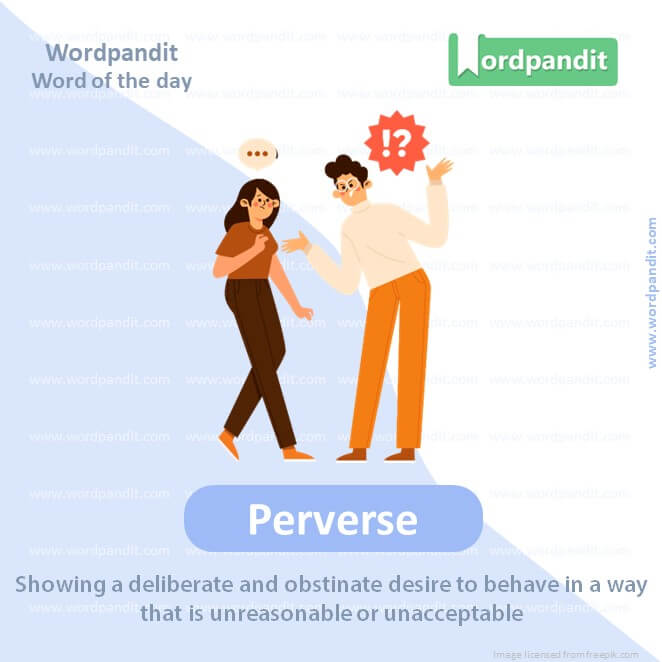
WORD-1: PERVERSE
CONTEXT: The perverse incentives in the current tax system have been criticized for encouraging wasteful spending.
SOURCE: The Times of India
EXPLANATORY PARAGRAPH:Imagine if you wanted to go straight, but you kept walking in circles instead, just because you wanted to be different. That’s what “perverse” means. It’s when someone does the opposite of what’s expected or right, just to be difficult.
MEANING:Showing a deliberate and obstinate desire to behave in a way that is unreasonable or unacceptable (adjective).
PRONUNCIATION: per-VERSE
SYNONYMS:
contrary, obstinate, wayward, stubborn, uncooperative
USAGE EXAMPLE:
1. She has a perverse desire to upset her parents with her choices.
2. It’s perverse to enjoy the cold when everyone else is shivering.
3. He took a perverse pleasure in seeing his rival struggle.
4. The cat often seems to have a perverse nature, avoiding the comfortable bed and sleeping on the hard floor.
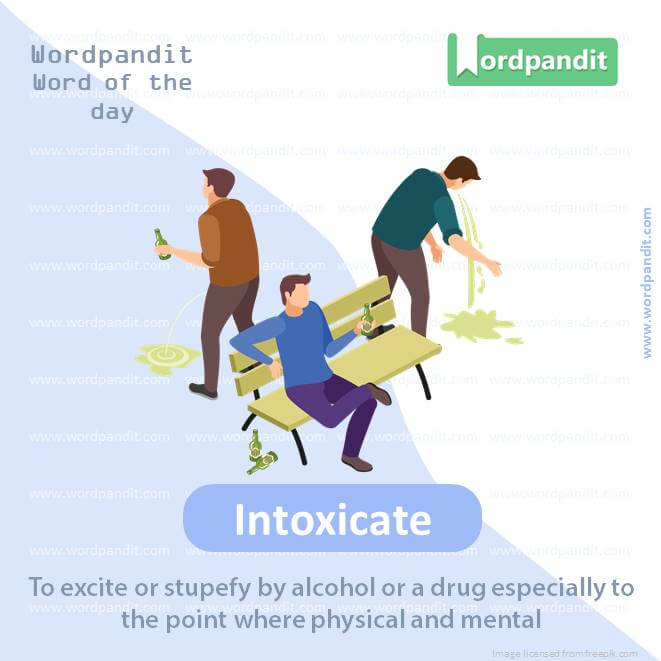
WORD-2: INTOXICATE
CONTEXT: The festival’s vibrant colors and lively music are enough to intoxicate anyone with its charm.
SOURCE: Hindustan Times
EXPLANATORY PARAGRAPH:You know how some drinks make grown-ups act silly and they can’t walk straight? Those drinks “intoxicate” them. It means they change the way someone thinks or acts, usually because of a drink or a strong feeling.
MEANING: To excite or stupefy by alcohol or a drug especially to the point where physical and mental (verb).
PRONUNCIATION: in-TOK-si-kate
SYNONYMS:
inebriate, besot, befuddle, exhilarate, excite
USAGE EXAMPLE:
1. The thrill of victory can intoxicate even the most humble person.
2. Alcohol can intoxicate if consumed in large amounts.
3. The aroma of the freshly baked bread was enough to intoxicate me.
4. The beauty of the mountain view seemed to intoxicate every visitor.
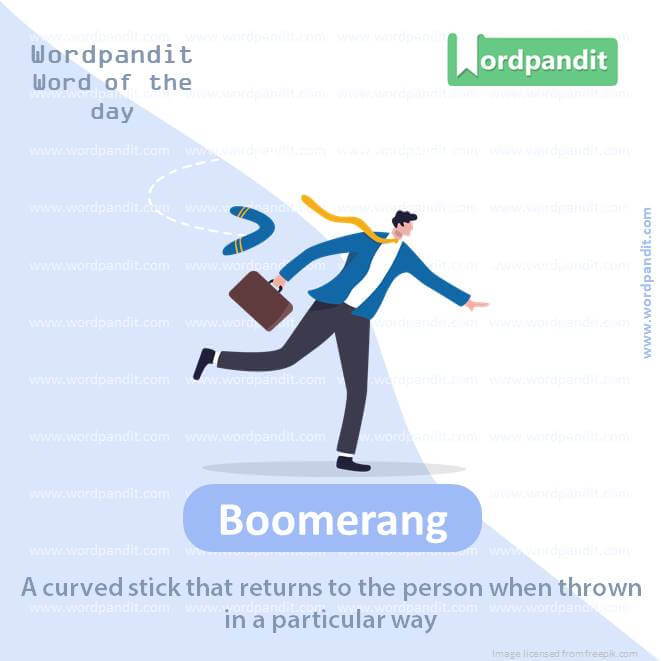
WORD-3: BOOMERANG
CONTEXT: The new policy, instead of benefiting the economy, seemed to boomerang, causing unexpected disruptions.
SOURCE: The Economic Times
EXPLANATORY PARAGRAPH:Have you ever seen a curved stick that when thrown comes back to the person who threw it? That’s called a “boomerang”. It’s not just a toy, it can also mean when something you do comes back to affect you.
MEANING: A curved stick that returns to the person when thrown in a particular way (verb).
PRONUNCIATION: BOOM-uh-rang
SYNONYMS:
1. returner, comebacker
2. rebound, ricochet, backfire, turn upon
USAGE EXAMPLE:
1. He threw the boomerang and watched as it arched back towards him.
2. Her sarcastic comments boomeranged when everyone started avoiding her.
3. The project boomeranged, leading to unexpected losses.
4. I gifted him a wooden boomerang for his birthday.
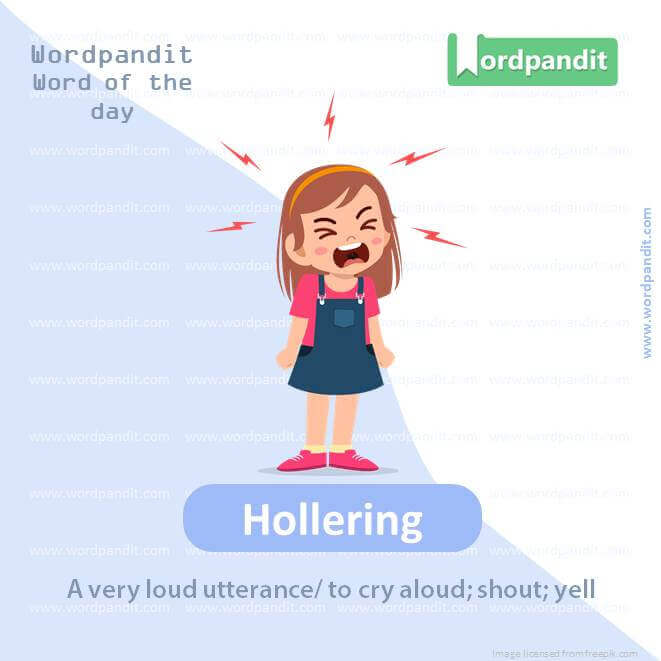
WORD-4: HOLLERING
CONTEXT: Protesters were seen hollering outside the parliament, demanding a change in the recent regulations.
SOURCE: Live Mint
EXPLANATORY PARAGRAPH:Imagine if you wanted to tell your friend something from across the playground, so you shout really loudly. That’s “hollering”. It’s like yelling or calling out loud.
MEANING:A very loud utterance/ to cry aloud; shout; yell (verb).
PRONUNCIATION: HOL-er-ing
SYNONYMS:
yelling, screaming, shouting, bellowing, calling out
USAGE EXAMPLE:
1. I could hear the kids hollering from the other end of the park.
2. Stop hollering, I can hear you just fine!
3. She was hollering for help when her bike tire went flat.
4. The coach was hollering instructions to the players during the game.
WORD-5: PROWESS
CONTEXT: The athlete’s prowess on the field has earned him accolades and adoration from fans across the country.
SOURCE: Indian Express
EXPLANATORY PARAGRAPH:Imagine being really, really good at something, like riding a bike or drawing pictures. That special skill or talent you have is called “prowess”. It means you’re super good at something!
MEANING: Great skill or ability in a particular activity or field (noun).
PRONUNCIATION: PROW-ess
SYNONYMS:
expertise, skill, mastery, talent, proficiency
USAGE EXAMPLE:
1. Her prowess in mathematics earned her many awards.
2. The athlete’s physical prowess was unmatched by his competitors.
3. With his gaming prowess, he easily defeated every opponent.
4. She demonstrated her culinary prowess by preparing a gourmet meal.
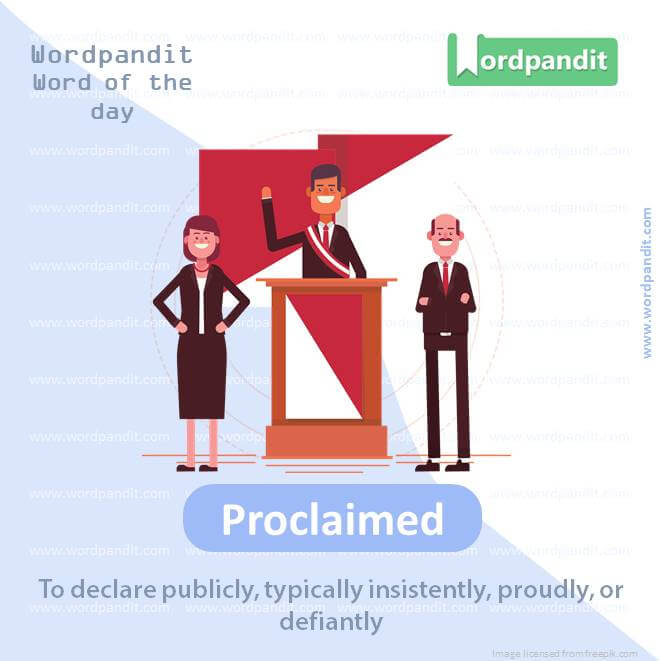
WORD-6: PROCLAIMED
CONTEXT: “The minister proclaimed the new infrastructure plan as a ‘game-changer’ for the nation’s development.”
SOURCE: The Times of India
EXPLANATORY PARAGRAPH: Imagine you have a big announcement, like “It’s my birthday today!” and you tell everyone about it. That’s like “proclaimed”. It’s when someone announces or says something publicly and loudly.
MEANING: To declare publicly, typically insistently, proudly, or defiantly (verb).
PRONUNCIATION: pro-KLAIMD
SYNONYMS: declared, announced, stated, broadcasted, publicized
USAGE EXAMPLE:
1. The mayor proclaimed the 10th of July as a public holiday.
2. She proclaimed her love for him in front of everyone.
3. The company proclaimed its new product launch with a grand event.
4. The winner of the competition will be proclaimed tomorrow.
WORD-7: FANATICISM
CONTEXT: “Experts warn against the rising tide of fanaticism and its potential repercussions on societal harmony.”
SOURCE: Hindustan Times
EXPLANATORY PARAGRAPH: You know how some people really, really love something, like a favorite toy, and they can’t stop talking about it? “Fanaticism” is when someone is super passionate about something, but sometimes they can be too intense.
MEANING: Extreme and passionate enthusiasm or zeal towards something, often to an unreasonable degree (noun).
PRONUNCIATION: fuh-NAT-i-sizm
SYNONYMS: obsession, zealotry, fervor, extremism, passion
USAGE EXAMPLE:
1. His fanaticism for the sport made him practice day and night.
2. They cautioned against the dangers of religious fanaticism.
3. Her fanaticism for the band led her to attend every concert.
4. The town was known for its fanaticism about baseball.
WORD-8: MARTYRDOM
CONTEXT: “The story of his martyrdom has inspired many and is a testament to the strength of his beliefs.”
SOURCE: Indian Express
EXPLANATORY PARAGRAPH: Imagine if someone did something very brave because they believed in it so much, even if it meant they could get hurt. “Martyrdom” is when someone suffers or gives up their life for a belief or cause they care about deeply.
MEANING: The suffering or death because of one’s beliefs or principles (noun).
PRONUNCIATION: MAR-ter-dum
SYNONYMS: sacrifice, persecution, suffering, ordeal, affliction
USAGE EXAMPLE:
1. His martyrdom inspired many to take up the cause.
2. The story of her martyrdom spread throughout the country.
3. They honored the martyrdom of their leader with a statue.
4. He faced martyrdom rather than denying his beliefs.
WORD-9: OUTRAGE
CONTEXT: “The decision to hike fuel prices sparked outrage among the masses, leading to widespread protests.”
SOURCE: The Economic Times
EXPLANATORY PARAGRAPH: Think of a time when something was so unfair or wrong that it made you really angry. That feeling of strong anger is called “outrage”. It’s when something is so wrong that it makes people upset.
MEANING: A strong feeling of shock and anger (noun).
PRONUNCIATION: OUT-rayj
SYNONYMS: indignation, fury, anger, ire, wrath
USAGE EXAMPLE:
1. The decision caused an outrage among the community members.
2. He expressed his outrage over the unjust ruling.
3. The public’s outrage was evident in the large protests.
4. The movie sparked outrage due to its controversial content.
WORD-10: DISDAIN
CONTEXT: “The author’s recent remarks showed a clear disdain for the current literary trends, stirring debates in literary circles.”
SOURCE: Live Mint
EXPLANATORY PARAGRAPH: Imagine if someone looked at your favorite toy and said, “I don’t like it, it’s not good.” And they say it in a way that’s a little mean. That’s “disdain”. It’s when someone feels that something or someone isn’t good enough and they show it.
MEANING: A feeling that someone or something is unworthy or beneath consideration (noun).
PRONUNCIATION: dis-DAYN
SYNONYMS: contempt, scorn, derision, disrespect, sneering
USAGE EXAMPLE:
1. She looked at the dirty shoes with disdain.
2. His disdain for traditional methods was evident in his approach.
3. She had a certain disdain in her voice when she talked about the old house.
4. He could not hide his disdain for the opposing team’s tactics.
Vocabulary Words in English
In the kaleidoscopic world of language, the thread of ‘vocabulary words in English’ weaves a rich tapestry. These words, the building blocks of communication, lend themselves to the eloquence and effectiveness of our speech and writing. Despite their significance, mastering ‘vocabulary words in English’ can sometimes be daunting, but with strategic approach, the process can be greatly simplified.
Learning ‘vocabulary words in English’ goes far beyond rote memorization. It requires an integrated approach that encompasses understanding and using the words. Consuming a diverse range of English materials such as novels, news articles, movies, music, and online content can acquaint you with words in actual use, helping you perceive both their meaning and usage in different contexts.
Furthermore, incorporating memory-enhancing techniques can add impactful strides to your journey of mastering ‘vocabulary words in English’. Methods such as the Leitner System or flashcards can bolster the memory retention of these words. Meanwhile, using mnemonic devices, associating words with unique stories or images, can help in retaining the ‘vocabulary words in English’ in long-term memory.
Another key to deciphering ‘vocabulary words in English’ is by practicing them in real-world contexts. Incorporate the new words into your daily conversations, written emails, or social media posts. Not only will this reinforce the meanings and applications, but also boost your confidence in using them.
In essence, understanding ‘vocabulary words in English’ is a continual journey that calls for persistent commitment, diverse learning approach, and ample practice. As you indulge in this exploration, you will find your command over the ‘vocabulary words in English’ becoming stronger, leading to more confident and dynamic communication. Remember – in the world of language, words are your faithful companions, and the more you engage with them, the more they’ll reveal their richness to you.









